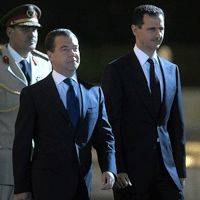Russia has adopted a surprisingly firm stance regarding the ongoing violent crackdown on domestic opposition in Syria. Despite facing a solid bloc of Western and developing nations calling for strong action against the brutal regime of President Bashar al-Assad, Moscow defiantly vetoed a draft U.N. Security Council resolution this weekend that would have supported the Arab League’s efforts to secure a peaceful transfer of power. Russian officials claimed that the resolution represented a masked call for “regime change” that would only help fuel the conflict. Although China also voted against the proposed resolution, Russia would probably have cast the sole but decisive veto even if Beijing had abstained.
Russian officials claim to have learned from last year’s experience with Libya -- when NATO expanded a U.N.-authorized no-fly zone into a campaign aimed at regime change -- that they cannot offer the Western powers any text that might be even remotely interpreted as justifying the use of force. As a result, the Russian government sought to establish a clear firebreak in the Syria resolution against any such wording. When the U.S., U.K. and French delegations rejected Russia’s proposed revisions, Moscow vetoed the Western-backed draft.
Russian officials have traditionally sought to make U.N. resolutions precisely worded to tightly constrain how the Western powers use them. Furthermore, they strongly support traditional interpretations of national sovereignty that severely restrict the right of foreign powers or international organizations to intervene in a country’s internal affairs. Some Russian leaders also seem to fear that the Arab Spring could spread into Central Asia, Iran and Russia’s own Muslim-majority regions in the North Caucasus, increasing internal and external tensions in nearby and sensitive regions for Moscow.

